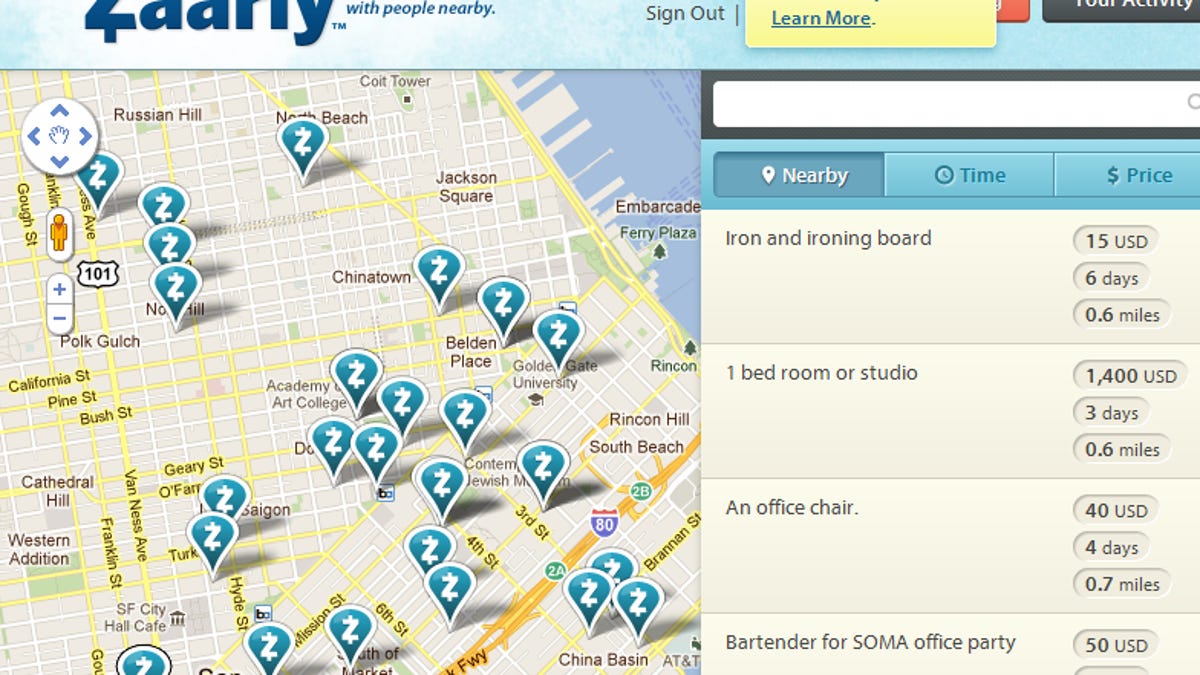Zaarly: Not nearly as crazy as it appears
It's not a crowdsourced Kozmo. It is a credible challenger to eBay and Craigslist.

Back in 1999 and 2000, when I was writing Catch of the Day, a daily column about start-ups for Red Herring, my co-worker Jeff told me I needed to launch a new column called "That's the Stupidest Thing I've Ever Heard" to cover all the boneheaded pitches I got for companies that were too sickly to write about.
A few months ago, as this second Internet bubble began to inflate, Jeff told me I needed to really--finally--launch That's the Stupidest Thing, specifically so I could write about Zaarly, based on the coverage it got on TechCrunch.
Zaarly is a well-hyped community gig marketplace, competing in many ways with GigWalk (story), FetchMob (story), and TaskRabbit.
CEO Bo Fishback is a big, twitchy man who seems uncomfortable sitting still. He is enthusiastic and eloquent about the idea that Zaarly is based on. I'd fund him if I was in a position to do so, even if I wasn't convinced (and I'm not) that Zaarly will be as big as Fishback says it can be. And how big is that? "It's the first idea I've seen in my life that will be bigger than a $50 billion company," he says.
Fishback calls Zaarly a buyer-powered market. Other markets--eBay, Craigslist, Macy's, Wal-Mart--are seller-powered. People with things to sell offer them up, and if you're looking for something, you check out what they have. On Zaarly, if you want something, you broadcast that desire; if someone has it, they find you.
When Zaarly first launched, it was taken by some to be a crowdsourced Kozmo: You could use it to get someone walking by a Starbucks to pick up a latte for you and then drop it off. That's one cute thing Zaarly can do, but it's not what it's really about. It is, rather, a broad, transparent, and social marketplace for pretty much anything. At a few months post-launch, Fishback says 43 percent of the items listed on Zaarly are requests for "stuff" (used electronics and hard-to-find books, for example), 40 percent for services (like haircuts), and 17 percent for "access to experiences" like baseball tickets.
In other words, it's just a big community bazaar. It's like Craigslist, but with a much stronger focus on what people want than what they have (Craigslist does have help-wanted and looking-to-buy categories). It also has a social angle, although in the current version it seems like an afterthought: you can get a link to an item on Zaarly and share it on Facebook or Twitter. Fishback says this social sharing of transaction requests is key. People will help their friends find things they need--it's what friends do for each other.
And, of course, it's location-aware. Items are located on maps, and the mobile app will show you what people are buying and selling near you.
Fishback believes Zaarly is a big network play, or in other words (mine, not his), a natural monopoly, even though some some specialty "collaborative commerce" services (like AirBnB for lodging or RelayRides for cars) might at the moment do a better job in their own niches. It's that belief that has Fishback swinging for the fences--with a company that's announced only $1 million in funding and whose users have posted just $2 million in potential transactions.
Fishback indeed is on to something big. The key here is to not see this as another Kozmo (which failed) or as a cute "fetch me a sandwich" pipe dream (which is not big business), but rather the modern competitor to eBay and Craigslist, both of which became huge and disruptive person-to-person marketplaces on their ways to becoming even bigger business-to-consumer platforms.
As slick as Zaarly appears right now, the site reflects the bare minimum functionality that Fishback envisions. Coming soon to Zaarly: seller tools, so if you run a lawn care business, for example, you'll be able to get alerts when a suitable gig request appears, or even automatically message back the poster.
Fishback is also looking at tighter social integration, which is vitally important to growth. You should be able to tell, for example, if someone requesting or selling a service is in your extended social network, which might make you more inclined to do business with them.
Zaarly has the obvious business model: It takes a cut of transactions that are run through the system, but it doesn't try to get in the way of people who use it for in-person cash transactions. Many of the details of how Zaarly will work in the future are still being decided. Fishback says he will be running multiple tests on the business: experimenting with fees and even with who pays them, the buyer or the seller.
A business designed to get random people to pick up a sandwich for people they don't know? That would indeed be the stupidest thing I've ever heard. Zaarly, thank goodness, is not that. Instead, it's an update on eBay and Craigslist, a person-to-person marketplace that can become a platform for small businesses, brought up to date with location awareness, social-network chops, and an adjustment of the bazaar marketplace that could make it easier than it's ever been for buyers to find the things they want.
Previously: Peer-to-peer money

